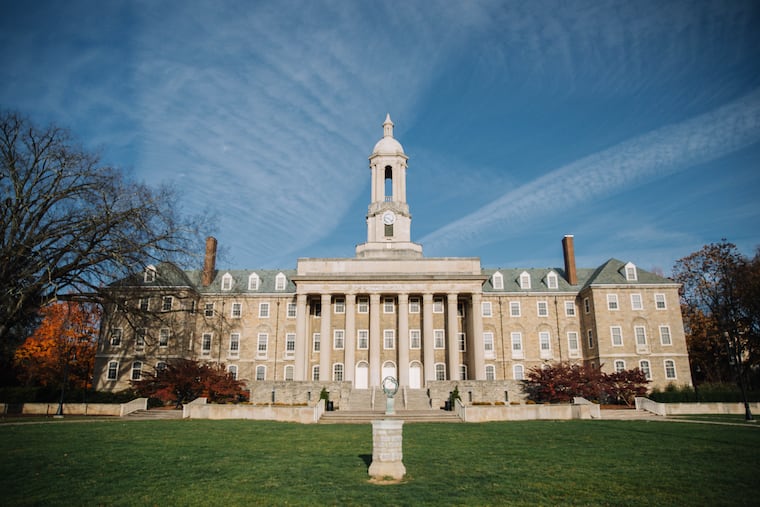Penn State Black faculty members hold ‘teach-in’ to protest president’s DEI update
The teach-in, which drew dozens in person and online, is a “time-honored” academic method hearkening back to activism on college campuses in the 1960s and '70s, organizers said.

Penn State president Neeli Bendapudi on Thursday unveiled the “first step” in a comprehensive effort to foster diversity, equity, inclusion and belonging at the university, including creating an online “hub” for students to find equity resources, investing in existing on-campus support, developing a comprehensive faculty hiring and retention program, and scrutinizing the school’s current system for reporting bias.
But across campus at the Flex Theater and over Zoom, a coalition of Black faculty members simultaneously hosted an alternative “teach-in” event, saying the university’s beleaguered diversity efforts ring hollow, and calling the format of Bendapudi’s presentation — one in which viewers were not permitted to ask questions in real-time — an “example of false transparency and the attempt to silence us all.”
“It’s insulting in the sense that they’re not even giving us the chance to participate in the process, nor ask questions about it,” said Gary King, professor of biobehavioral health at Penn State and coauthor of the “More Rivers to Cross” report, which in 2021 outlined diversity issues to address among faculty at Penn State. In particular, the report called on the university to address lackluster efforts to hire and retain Black professors, and found that a majority of Black faculty who responded to a survey said they had faced racism from students, administrators, supervisors, and colleagues.
Bendapudi’s livestreamed Thursday event, King said, was “essentially a teaching of what not to do with regard to matters of anti-racism and DEI, particularly as it relates to an announcement of a grand plan ... that’s going to affect almost 100,000 students, and it’s also going to affect staff, the faculty as well.”
» READ MORE: ‘What gets measured gets managed’: Penn State president launches her vision for the university
The teach-in, which drew dozens in person and online and featured student and faculty speakers, is a “time-honored” academic method hearkening back to activism on college campuses around the Vietnam War and civil rights in the 1960s and ‘70s, King said.
“It is important to have an independent voice from the administration,” he told the group Thursday.
A university spokesperson said the format of the livestreamed discussion between Bendapudi and Jennifer Hamer — the special adviser for institutional equity, whose findings were presented during the hour-long conversation — was selected because “it would be difficult to expect members of our community to ask questions in a town hall format when they had not yet had the benefit of hearing the findings or initial recommendations, having not heard any initial institutional commitments, nor had time to digest them.”
The presentation included a link to a form to submit questions or comments, and Bendapudi said students, faculty and staff will be able to provide feedback on a summary of the university’s findings to be published on the school’s website Friday.
During the university’s livestream, Hamer extended her thanks to various groups, specifically naming the “More Rivers to Cross” authors.
“They’re the ones I feel like have been really pushing for the university to do more,” she said. “We absolutely heard you and appreciated the time that you gave us earlier this semester.”
During the livestream, Hamer said she had spent eight weeks meeting with campus stakeholders to understand where the university’s existing DEI efforts stood, and developing recommendations including centralizing siloed DEI strategies across the campuses, investing in hiring and retaining diverse professors, and bettering the system for reporting bias and harassment.
Still, the teach-in highlighted the rift over Penn State’s diversity initiatives and comes amid mounting tensions at the university over racial equity. Last fall, Penn State canceled its plans for a Center for Racial Justice — an initiative born from the 2020 racial justice protests and once touted as “just the beginning” of the university’s antiracism efforts. The cancellation drew rebuke from more than 400 faculty members who, in a letter to university leadership, accused Penn State of “backsliding” on commitments to racial equity.
» READ MORE: Penn State president Neeli Bendapudi defends decision to cancel Center for Racial Justice
Bendapudi, Penn State’s first president of color who started her tenure in 2022, later defended the decision to reverse course on the center, saying the university would still prioritize racial equity, including measuring retention of students of color and the diversity of its faculty.
The university again faced backlash last fall after a conservative student group planned to host a campus event featuring Proud Boys founder Gavin McGinnes. The school ultimately canceled the comedy show the day of the event, citing “violent” student demonstrations and counterprotests against the far-right white nationalist group leader.
» READ MORE: Penn State cancels appearance by Proud Boys founder after protest and ‘threat of violence’
And earlier this month, professor Michael West, head of the African American studies department, publicly resigned from his post, blaming university leadership for breaking commitments to hiring tenure-track African American studies faculty, as well as wavering on their commitment to diversity.
Since his resignation, West, who has been at Penn State for four years, said his concerns have been dismissed.
In a statement through a university spokesperson, leaders said claims that the college broke promises to the African American studies department are “false” and that they are seeking a new head of the department.
During Thursday’s teach-in, West was commended by King as one who “exemplifies what courage is, and what it takes to change a university, a community, a society, a world.”
“As they say in East Africa, when the elephants fight, it is the grass that suffers,” West told the group. “It is from there, in the grass, that the soul of the university must be lifted up — and the struggle for racial justice fought, and won.”